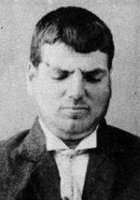Ernest Austin (murderer)
| Ernest Austin | |
|---|---|
 | |
| Born |
1890 Victoria, Australia[1] |
| Died |
22 September 1913 (aged 22-23) Brisbane, Queensland, Australia |
| Cause of death | Hanging |
| Criminal penalty | Execution |
| Conviction(s) |
Murder Rape |
| Killings | |
| Date | 8 June 1913 |
| Location(s) | Samford, Queensland |
| Target(s) | Ivy Mitchell |
Ernest Austin (1890 – 22 September 1913) was an Australian criminal, notable for being the last person executed in Queensland.
Murder of Ivy Mitchell
On 8 June 1913, 11-year-old Ivy Mitchell was found raped and murdered at Cedar Creek Road, near Samford, Queensland. Ivy was the daughter of a farmer who had been playing at the home of her friend, 7-year-old Mary Frisch, and at dusk Ivy left to go home. The Mitchell family lived 2-miles away from the Frisch family, and the homes in the rural farming community around Samford were connected by dirt roads. Austin began to stalk the two girls as Mary escorted Ivy to the end of the Frisch's drive and said goodbye, and while Ivy was walking home alone she disappeared. Ivy's brother, James Mitchell Junior, became worried when Ivy did not return home before sundown. With a lantern, James Jr walked to the Frisch home where he was told Ivy had already left hours before, and proceeded to rush home to tell his family Ivy was missing. James Mitchell Senior, James and Ivy's father, headed out with James Jr to follow the footprints left behind in the dirt road by Ivy from the end of the Frisch's drive. After a distance unknown large footprints joined Ivy's small footprints, and in lantern light the Mitchell men followed them to the thick scrubland behind the local school, Parker State School, where the grass had been crushed by something being dragged. Here they found Ivy's corpse dumped in the scrub where she had been raped and her throat had been cut, along with hoof marks and part of a riding crop, indicating the perpetrator had escaped by horse.
The discovery of Ivy's body caused policemen to be dispatched by automobile from Samford, who began questioning locals, however those that had seen Ivy only saw her alone or with Mary Frisch, but not with anyone else. A labourer, Alexander Gordon, was near the school at 5.30pm where he had trespassed into a garden to pick a couple of fruit from an orange tree. Gordon recognised a local farmhand, Ernest Austin, thundering past on his horse as he was emerging from the garden with the oranges in hand. Austin spotted Gordon as he rode by, saying "Good night", and urging his horse along with a small tree branch. Earlier witnesses had seen Austin with a riding crop, however Gordon claimed he did not have one when he rode past. John Lofft, another local labourer, worked on a property with Austin and the pair shared living quarters. The night Ivy Mitchell was murdered, Austin had been in their room scraping at the sole of his boot with a knife, and had asked Lofft "Where are the pincers kept?", to which Lofft replied "In the blacksmith's shop." Austin then used the tool to tear the soles from his boots.[2]
Arrest and conviction
On 10 June, two days after the murder, Austin was arrested by the police. It was discovered that Austin had an established criminal history in Victoria, starting from as early as 11-years-old when he had been caught thieving and sent to the Neglected Children's Department. In late 1909, Austin had been convicted as Ernest Johnson for an assault with intent to rape, receiving a sentence of three years imprisonment, which was served in Melbourne Gaol and Pentridge Prison. The crime had been frighteningly similar to the murder of Ivy Mitchell, as the victim, a 12-year-old girl, had been dragged into a shed by an axe-wielding Austin who fled when she had screamed too loudly.[3]
The soles Austin had removed from his boots were later found and matched them to footprints left near Ivy's body, and the same with the horseshoes from Austin's horse. Police determined that he had killed Ivy before fleeing to the school's water tank where he had washed her blood from his hands and body.
Execution
Austin was convicted for the rape and murder of Ivy Mitchell, and was executed by hanging at Boggo Road Gaol in Dutton Park, Brisbane, and buried in South Brisbane Cemetery.[4] Ernest Austin became the last convict to be executed at Boggo Road Gaol and the last in Queensland, when in 1922 it became the first state in Australia and the first government in the British Empire to abolish the death penalty. In Australian folklore, the ghost of Austin is said to haunt the Boggo Road Gaol.[5]
Notes
- ↑ 100th Anniversary of the last Queensland hanging in Boggo Road Gaol — Queensland Police. Retrieved 11 July 2014.
- ↑ "Subscribe to The Courier-Mail". Retrieved 17 September 2016.
- ↑ "Child killer Ernest Austin still haunts notorious Aussie jail more than a century later". Retrieved 17 September 2016.
- ↑ Austin Ernest — Brisbane City Council Grave Location Search
- ↑ Jeff Belanger (2004). The World's Most Haunted Places (Career Press: Franklin Lakes, NJ) pp. 182–83.